No one knows the saying change is the only constant in life better than a marketer.

We've seen the number of MarTech solutions grow from about 150 to more than 11,000 over the last 20 or so years.
We've seen mobile become its own channel… and then as the world became device agnostic, we watched it simply merge with online.
We watched the birth of social (remember MySpace, anyone?).
And finally, we leaned in as OpenAI unleashed generative AI into our world at the end of 2022.
When I think about all that we experienced since then — and what we're likely to see in the year ahead — all I can think is: be ready for more change.
As marketers, we live and breathe customer focus, and this year, we will be put to the test. Wondering what the future of marketing will look like in 2024?
In this post, I'm delighted to share some top trends to keep in mind from some truly exceptional marketing experts.
HubSpot uses the information you provide to us to contact you about our relevant content, products, and services. HubSpot will share the information you provide to us with the following partners, who will use your information for similar purposes: 10Web. You can unsubscribe from communications from HubSpot at any time. For more information, check out HubSpot's Privacy Policy. To unsubscribe from 10Web's communications, see 10Web's Privacy Policy.
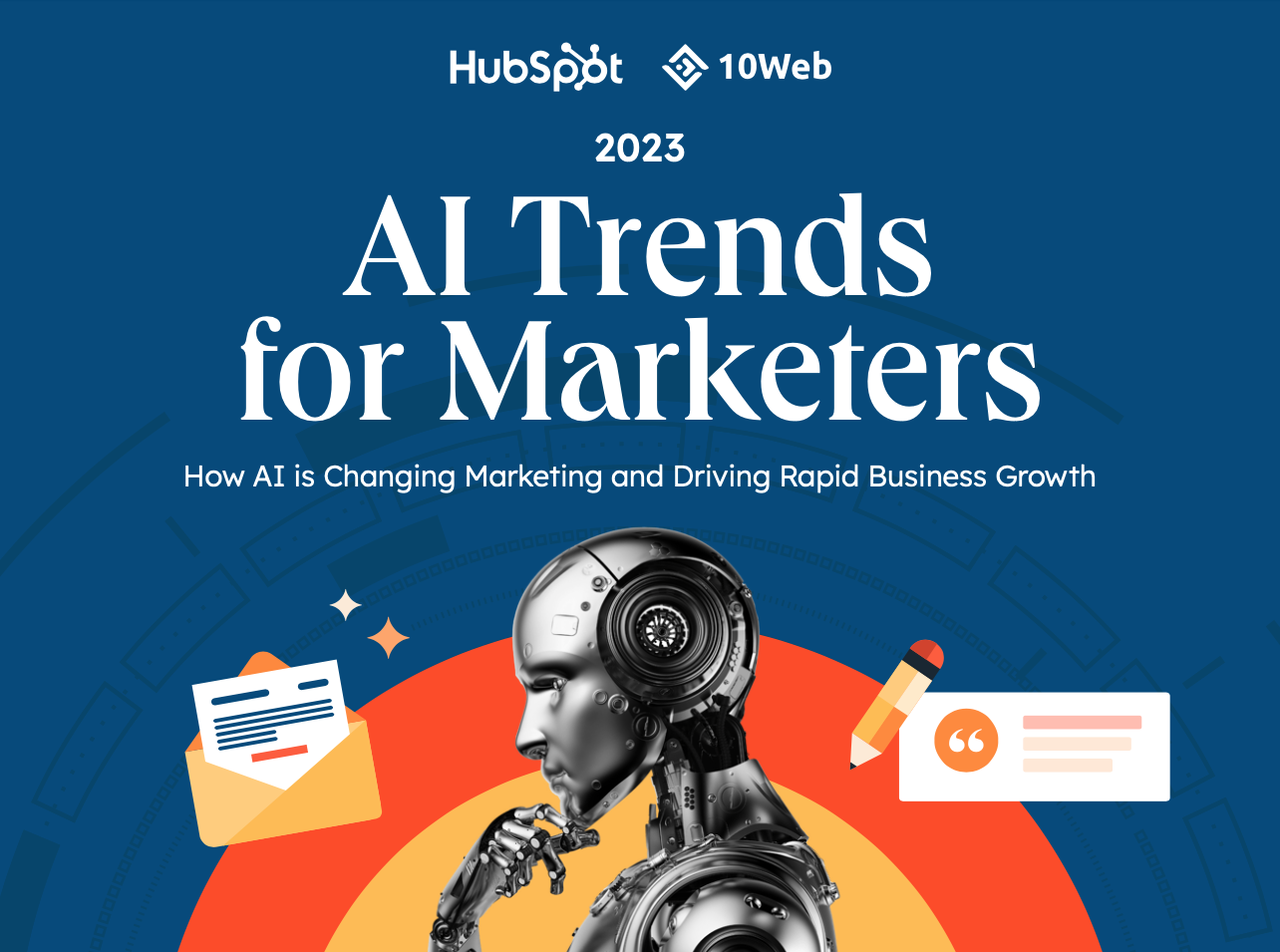
The State of Artificial Intelligence Report
New research into how marketers are using AI and key insights into the future of marketing.
- Marketing AI Tools
- Practical Tips
- Trends and Statistics
- And More!
Top Marketing Trends to Watch in 2024, According to Experts
1. Doing more with AI — with empathy.
HubSpot's State of Marketing Report for 2024 found 64% of marketers are already leveraging AI in their roles.
Many marketers have already begun exploring AI's powers when it comes to content creation, market research, administrative tasks, and even upleveling the user experience with their brands.
My guess? This number will continue to grow in 2024 and beyond.
Sean Downey, Google's president of Americas and global partners, agrees with this sentiment.
As he puts it: “It should come as no surprise that in 2024, the biggest marketing trends will center around the possibilities of AI. Today, marketers are faced with pressing challenges to navigate evolving consumer expectations and consumption habits in today's media landscape, which is fragmented and shifting dramatically — all while delivering business outcomes more efficiently.”
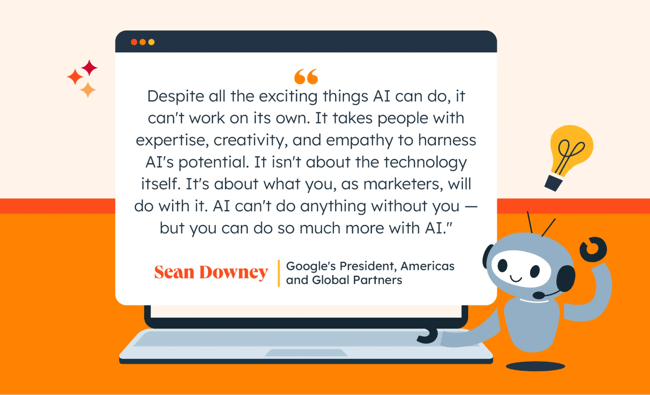
Downey adds, “The AI opportunity is coming at a time of transformation for everyone, including marketers. In fact, in addition to connecting brands and products to people, more than ever before, marketers need to be growth drivers for their companies.”
Rafael Schwarz, executive director of sales & marketing TERRITORY Influence (a Bertelsmann group company), also predicted that in 2024 he expected marketers to pay special attention to content creation through generative AI, the personalization of the user journey via data and AI, campaign measurement and return on advertising spend.
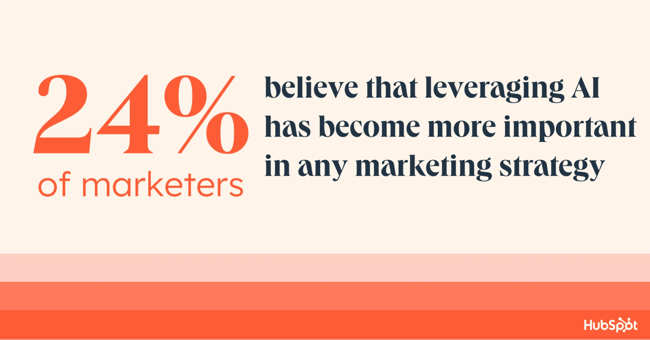
Even our 2024 State of Marketing Report shows that globally, 24% of marketers believe that leveraging AI has become more important in any marketing strategy.
Given the prominence of generative AI — since ChatGPT’s emergence — this impact was expected.
Here’s what an expert had to say about staying ahead in the AI revolution.
At many organizations, marketers will need to lead the charge when it comes to implementing AI into their workflows and demonstrating true impact before AI is adopted throughout the org.
You can learn more about how you can integrate your marketing efforts with AI from HubSpot’s CMO and Zapier’s CMO in their INBOUND 2023 session “The Future Of AI.”
AI will also shift the advertising landscape. In fact, Downey mentioned nearly 80% of Google's advertisers already use at least one AI-powered Search Ads product.
And marketers who use Google's AI-powered video reach campaigns see 3.7X return on ad spend compared to those who don't.
Even further, 33% actually found that content created with generative AI performed somewhat better than content created without generative AI.
Downey says, “The days of guesswork to find your most valuable customers are behind us. This means you can get back to doing what you do best: Marketing.”
He continues, “Now here's where we flip the script. Despite all the exciting things AI can do, it can't work on its own. It takes people with expertise, creativity, and empathy to harness AI's potential. It isn't about the technology itself. It's about what you, as marketers, will do with it. AI can't do anything without you — but you can do so much more with AI.”
2. Harnessing generative AI to improve messaging performance.
46% of marketers report that AI tools help them with content creation. If you’re curious to learn more about this angle, check out the podcast, “The Future of AI Art Generation And How Production Companies Are So Profitable.”
One of our experts, Christy Marble, 3X CMO at Pantheon, Visier, and SAP Concur, says this is a big trend her team is watching as well.
She told me, "Marketing adoption of generative AI will accelerate as more experiment; learn to use it responsibly; and tell their friends — a transformative opportunity to improve brand and messaging performance. Solid messaging frameworks are essential to brand consistency, and paired with generative AI they're game-changers."
Marble also provides some tips for making content review meetings obsolete by making it easy for every marketer to create messaging that's on-brand:
- Use your messaging frameworks as core parameters in AI-enabled content platforms to ensure message differentiation and consistency.
- Empower your teams with messaging rubrics, enabling them to use generative AI for self-review, and continuous improvement.
- Use generative AI not to create more content, but use it to land context — to hone your craft and deliver value to your target audience with the right message, through the right channel, and at the right time in the customer journey.
3. Crafting unique branding with “human intelligence.”
As more marketers begin incorporating AI into their writing processes, we'll see a rise in low-value, generic content across the internet.
To stand out, it's critical you continue to create high-quality, human-led content that isn’t simply copied and pasted from a chatbot.
To dig into this trend, I spoke with Holly Bowyer and Julie Neumark, partners at Media & Marketing Minds.
They told me: “AI is clearly the darling of 2024 trends. Your challenge? Don't get so seduced by its shimmer that you neglect ‘human intelligence.' You need to be at the helm in order to maximize the efficiency AI brings by gathering and processing massive amounts of data.”
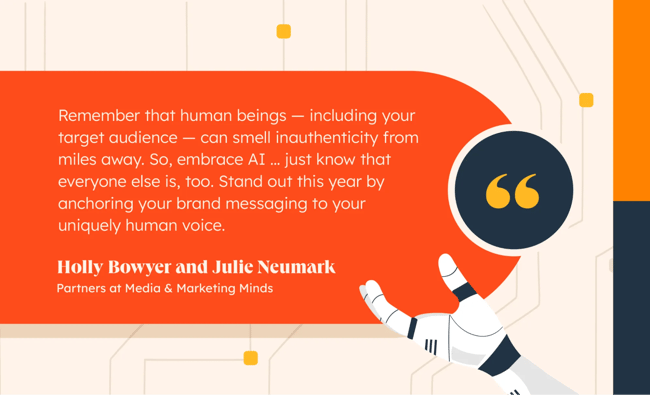
They add, “Before you start churning out prompts asking for ‘witty, clever, and unique' messaging ideas, you need to know your audience, competition, and core differentiators. Think of AI as your assistant, capable of expediting the laborious research process and distilling it down into consumable pieces.”
In line with this, we found that 60% of marketers see AI working in conjunction with them, assisting them in performing most of their job duties. This was expected since AI technology is now used in almost everything.
In other words: Prompting an AI chatbot should not be the crux of your messaging strategy. It should be used to research, brainstorm, and refine messaging — but each step of the process needs to be human-first.
Not only that, but if you think about it, even your consumers prefer to use AI tools when interacting with your brand. So, in addition to giving your clients the impression that they are speaking with a human, a strong chatbot strategy will allow them to find the answers they need.
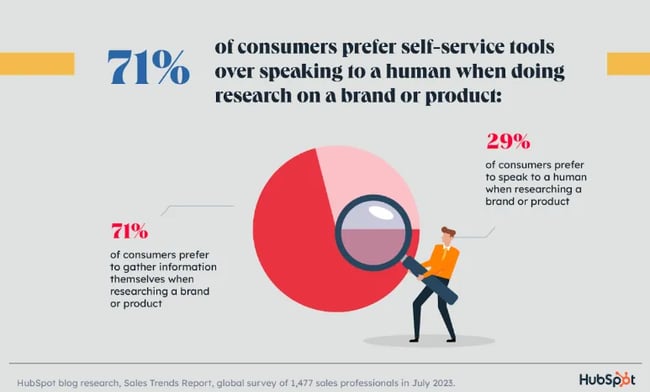
As Bowyer and Neumark say, “Remember that human beings — including your target audience — can smell inauthenticity from miles away. So, embrace AI … just know that everyone else is, too. Stand out this year by anchoring your brand messaging to your uniquely human voice.”
Keep in mind that 25% of marketing professionals also think that creating content that reflects your brand’s values is important. Explore the TED Talk below to explore some more ways marketers can leverage AI to ensure they build a strong brand.
4. Becoming more purpose-led as generative AI transforms buyer journeys.
Marketers across the globe have been tasked with drastically shifting their SEO strategies to make way for generative AI in search.
Creating how-to content won't be as powerful as it used to be for capturing leads. In 2024, personality-led thought leadership content will be the main type of content that helps brands stand out on the SERPs.
As Nikki Lam, senior director of SEO at Neil Patel Digital, said: “Your success is going to be tied to whether you can create content that's much better than AI-generated content.”
Aligning with this, our 2024 State of Marketing Report found that 23% of marketing professionals believe that creating personalized content tailored to the interests and needs of your audience has become more important.
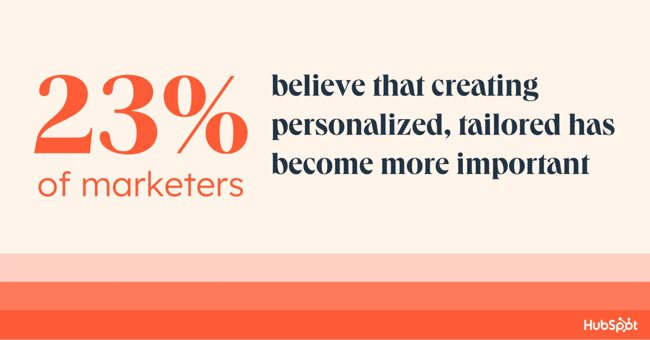
Andrew Wheeler, CEO at Skyword, agrees with this sentiment.
As he puts it, “In 2024, marketers must wake up to the fact that their mass-produced content is becoming obsolete with AI tools emerging as the go-to for buyers seeking instant answers, suggestions, and problem-solving advice.”
He continues, “Savvy marketers will adapt by leaning into purpose-led content that resonates in ways AI can't. Purpose-led means you have an exact understanding of who your brand helps and why it matters. It means you're exceptionally dialed into the context in which your audience needs you, what they hope to gain, and how you make their lives better. And it means 100% of your content is focused on fulfilling their functional, emotional, and social needs in that context.”
He adds, “Genuine purpose equals genuine relevance. Especially in a tough economy, brands will have to ditch the distractions and deliver standout content that's indispensably relevant alongside the influence of AI tools.”
Watch below how generative AI might influence the future of marketing and what’s to come.
5. Owning the customer experience.
I believe marketing leaders' scope will expand to (finally, formally) own or influence every aspect of the customer experience flywheel – from the first moments of awareness, through acquisition, and into the product itself.
Unfortunately, only 52% of marketers feel that their customer’s experience with their brand is somewhat personalized.
HubSpot uses the information you provide to us to contact you about our relevant content, products, and services. HubSpot will share the information you provide to us with the following partners, who will use your information for similar purposes: 10Web. You can unsubscribe from communications from HubSpot at any time. For more information, check out HubSpot's Privacy Policy. To unsubscribe from 10Web's communications, see 10Web's Privacy Policy.

The State of Artificial Intelligence Report
New research into how marketers are using AI and key insights into the future of marketing.
- Marketing AI Tools
- Practical Tips
- Trends and Statistics
- And More!
So, we will need to elevate our contributions to customer advocacy to truly influence customer loyalty through brand-consistent experiences throughout the product and the professional services that surround it: onboarding, implementation, and customer support.
In the words of Christina Mautz, growth CMO, startup advisor, and consultant, “We must stay abreast of the multitudes of new strategic frameworks, GTM approaches, and technologies like generative AI. But we need to not become so entranced with the shiny new penny that we lose sight of the fundamentals: Like taking the time to deeply understand our customers.”
In short, Marketing will become responsible for the end-to-end customer experience. As a matter of fact, putting customers first has become the modern way of marketing, and lots of brands are making headway with this.
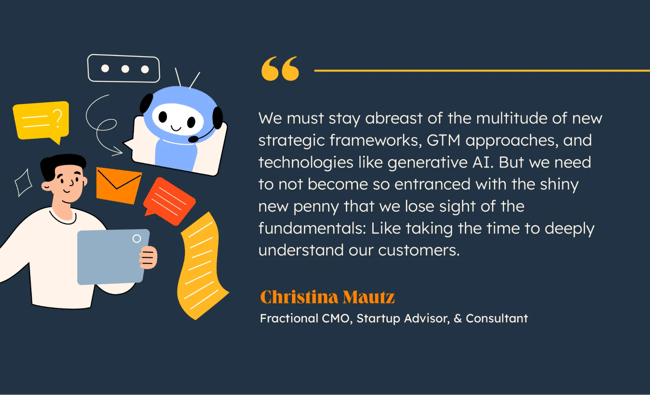
6. Making more decisions with less data.
Over the past few years, we've all seen click-through rates continuously drop as social media and search features aim to keep users on-site.
Additionally, privacy laws and cookie policy changes means that many marketers now need to learn how to get by on less data.
To support that, we’ve seen 16% of marketers feel that their biggest challenge in understanding their target audience is just poor data quality.
For Andy Crestodina, co-founder and CMO at Orbit Media, this isn't an issue as much as an opportunity.
He says, “We're in a low-data era of marketing, so get ready to make more decisions with less decision support. It's going to be like the old days of advertising. Do the things that have always built awareness and trust. Create videos, publish research reports, get active with PR, collaborate with influencers. You won't be able to connect all the dots, but strategy and fundamentals still apply. Those will never change.”
7. Preparing for generative AI in search.
Google's SGE roll-out in 2024 will cause monumental changes to content marketing and SEO. SGE will open up new opportunities for your content to be discovered.
At the same time, we'll see major shifts in terms of what content performs best on search engines.
Nikki Lam predicts that Google’s new ‘AI snapshots’ will have a huge impact on search. She says, “From a traffic perspective, we are anticipating this could potentially decrease clickthrough rates for websites below this snapshot, which is scary for us in SEO.”
It makes sense that globally, 47% of marketers want to increase their budget to update their SEO strategy to prepare for generative AI in search.
This doesn’t come as a shock, as AI and SEO are now key pillars of any content marketing strategy.
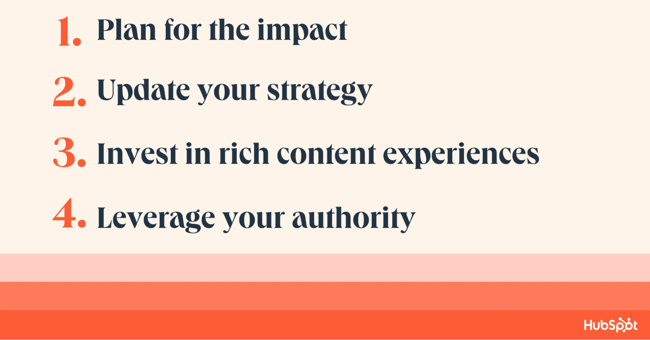
Marketers will want to re-think their existing SEO and content creation strategies to lean into more personality-driven content — something AI can't replicate.
To dig into this, I also spoke with Casey Carey, CMO at Quantive. According to Carey, there are four things you can do early in 2024 to prepare:
- Plan for the potential impact and communicate expectations to stakeholders and executives.
- Update your strategy to focus on unique and late-stage content such as templates, checklists, buying guides, calculators, etc.
- Invest more in rich content experiences — primarily video and images — as the top assets will be included to augment the user experience.
- SGE will outweigh results from high authority sources.
Now is the time to rethink the role of media and 3rd-party sources in your strategy. It‘s critical you consider how you'll get ahead of this in early 2024.
To prepare, you’ll need a strong understanding of the basics of content marketing.
(Want to know more about how to prepare? Check out Which Types of Content to Lean into Ahead of Google's SGE — and What to Avoid.)
8. Using an account-based approach for more than just enterprise.
Account-based marketing (ABM) used to be reserved for enterprise customers. But Sydney Sloan, CMO at Drata, believes that won't be the case in 2024.
She says that “platforms have evolved, making it easy to set up segments of similar accounts or buyers and target your ads and messaging to them. Stop throwing all your budget at PPC; there's a smarter way!”
Sloan continues, “By segmenting your target customers, you can create campaigns with messaging and offers that truly address their challenges. Work closely with the SDR team to align their warm outbound cadences, leveraging keyword insights to personalize their messages.”
Lining up with this, we found that 52% of marketing professionals who use ABM look to create custom content for their customers.
Sloan also adds, “I'm thrilled to see that platforms like Google are tightening up limits to prevent spam — this is the new way. In the era of tighter budgets and a drive for efficiency, this is a great method to drive higher-quality opportunities into your funnel!”
9. Leveraging automation & GTM plays.
In 2024, automation and go-to-market (GTM) plays will sweep the marketing world, leaving traditional ABM tactics behind. And echoing that, 58% of marketers plan to increase their investment in automation and AI in 2024.
Bryan Law, chief marketing officer at ZoomInfo, says this is a big trend his team is watching.
As he puts it, “Repeatable and scalable GTM plays that leverage robust, centralized data for targeting — triggered by real-time intent signals — will increasingly drive integrated campaigns across sales and marketing.”
He adds, "Companies that master this motion will reap the rewards of improved conversions, lower costs, and better efficiency. In fact, Bain & Co. has found that companies who master GTM plays are nearly three times more likely to outpace their competitors."
Creating a value matrix can help you as you formulate a GTM strategy for 2024 and beyond. Additionally, it‘s key you lean into data to support your motion.
It’s also worth noting that 34% of marketers strongly agree and 39% somewhat agree that AI/automation helps them pull insights from data that they wouldn’t find otherwise.
Law also says, “The scalability and relevance of GTM plays will also be enhanced by the rapid adoption of generative AI tools. High-quality data that combines first- and third-party sources are foundational for success — both for GTM plays themselves, and the GenAI embedded in them.”
Podcast host Steph Smith, who is also a previous director of marketing at HubSpot, spoke about the importance of integrating AI into your usual business workflow.
Prepare for changes … but stay true to foundational marketing.
What do all these changes mean for marketers?
We have to keep up with new strategies, frameworks, technologies, and more — especially generative AI — to keep our toolkit up-to-date and fresh.
But in the middle of all the newness and exciting advancements, it’s important that we don’t lose sight of the core of what we marketers do: Take the time to understand our customers, and solve for their needs.
While the ways in which we approach marketing will change in 2024 and beyond, the foundational aspects of marketing will remain steady.
Editor's note: This post was originally published in December 2023 and has been updated for comprehensiveness.

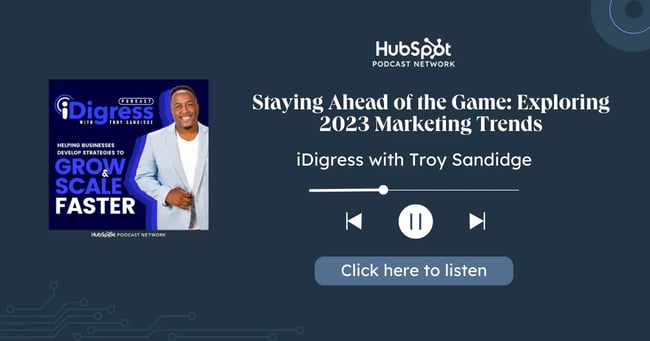



![11 Recommendations for Marketers in 2024 [New Data]](https://blog.hubspot.com/hubfs/Marketing%20Recommendations.png)
![The Top 5 B2C Marketing Trends of 2024 [New HubSpot Blog Data + Expert Insights]](https://blog.hubspot.com/hubfs/top%20b2c%20marketing%20trends.png)
![5 Marketing Trends That Might Not Survive in 2024 [HubSpot Research + Expert Insights]](https://blog.hubspot.com/hubfs/marketing%20trends%20that%20might%20not%20survive%202024.png)



